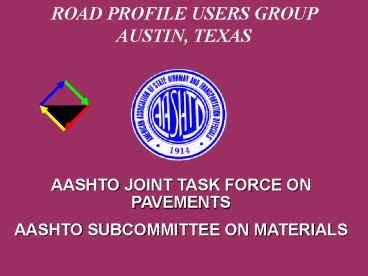ROAD PROFILE USERS GROUP AUSTIN, TEXAS - PowerPoint PPT Presentation
1 / 29
Title:
ROAD PROFILE USERS GROUP AUSTIN, TEXAS
Description:
AASHTO's mission is to advocate transportation policies, provide technical ... Kenneth McGhee. Rigid Pavement. Michael I. Darter. Objective ... – PowerPoint PPT presentation
Number of Views:77
Avg rating:3.0/5.0
Title: ROAD PROFILE USERS GROUP AUSTIN, TEXAS
1
ROAD PROFILE USERS GROUP AUSTIN, TEXAS
AASHTO JOINT TASK FORCE ON PAVEMENTS AASHTO
SUBCOMMITTEE ON MATERIALS
2
AASHTO VISION STATEMENT
- AASHTO will be the voice for transportation and a
catalyst for institutional and technical
excellence.
3
AASHTO MISSION STATEMENT
- AASHTO's mission is to advocate transportation
policies, provide technical services, demonstrate
the contributions of transportation and
facilitate institutional change.
4
AASHTO GOALS
- Advocate Transportation
- Provide Technical Services
- Demonstrate the Contributions of Transportation
- Facilitate Institutional Change
5
AASHTO JTFP
- 1993 Meeting
- FHWA Contract TRDI
- JTFP Establishes Protocol Committee
- FHWA Supports Travel 1995 (?)
6
AASHTO ProtocolsbyCarl Bertrand, TxDOT
- 11th Annual Road Profilers Users Group Meeting
1999
7
PROVISIONAL PROTOCOLS(Were being Re-Balloted)
- Quantifying Roughness on Pavements (AASHTO
PP37-99) - Determining Max. Rut Depth in ACP (AASHTO
PP38-99) - Estimating Faulting of Concrete Pavements
(AASHTO PP39-99)
8
National RT Partnership ForumInfrastructure
Renewal (1999)
- Business Needs for
- Pavement Engineering
9
AASHTO Joint Task Force on PavementsOct 1-3,
2000Irvine, California
- Business Needs For Pavement Engineering
10
12th AASHTO ProtocolsbyKen Fults, TxDOT
- 12th Annual Road Profilers Users Group Meeting
2000
11
PROTOCOLS
- Pavement Roughness PP37-00
- Rut Depth PP 38-00
- Faulting PP 39-00
- Cracking in AC Surface PP 44-00
- Has not passed AASHTO balloting
12
AASHTO Provisional Standards for Measuring
Pavement Condition
- A Roadmap for
- Quality Data Collection
OCTOBER 30, 2000
13
What We Agreed On
- Standards can improve quality of data collection
- We need QA/QC and validation/certification
procedures - Vendors
- Willing to assist in the implementation
- Will work with AASHTO Joint Task Force to improve
Standards - Cost savings are possible with full implementation
14
Action Plan
- Priority 1 QC/QA and certification for
roughness - Priority 2 Refine cracking standard to allow
adoption by AASHTO - Priority 3 Rut depth definition and resolution
- Priority 4 Faulting definition and resolution
- Priority 5 QC/QA and certification for other
Standards
15
Funding
- NCHRP 20-7
- FHWA may fund QC/QA work
16
NCHRP WORKSHOP
- NCHRP 20-51(01)
- August 25-28, 2001
- Irvine, California
- REPORT PENDING
17
FHWA SMOOTHNESS ETG
- Mark Swanlund, FHWA
- David Law, FHWA
- Laurin Lineman, Fed Lands
- Bruce Wasill, Fed Lands
- Starr Kohn, Consultant
- Dan Frentress Gerald Voigt ACPA
18
FHWA SMOOTHNESS ETG
- John Andrews, Maryland DOT
- Steve Karamihas, Univ. of Michigan
- Kevin McGehee, Virginia DOT
- Jim Delton, Arizona DOT
- Emmanuel Fernando, TTI
- Kent Hanson, NAPA
- Ken Fults, Ex TxDOT
19
- EQUIP SPEC, MP 11-03
- INTERIAL PROFILER CERTIFICATION, PP 49-03
- INTERIAL PROFILER OPERATION, PP 50-03
- INTERIAL PROFILER CONSTRUCTION SPECIFICATION, PP
51-03
20
AASHTO SOM
- MP11-03 Vote 49/1
- PP49-03 Vote 47/3
- PP50-03 Vote 46/3
- PP51-03 Vote 45/5
21
AASHTO SOM MeetingAugust, 2003 Maryland
- All Negatives voted non-persuasive or withdrawn
- All Comments Addressed by Editorial or voted
non-persuasive - All Protocols approved by AASHTO
22
AASHTO-AGC-ARTBATASK FORCE 45
- Develop AASHTO Standards, Equipment Certification
Programs, QA/QC Procedures for Condition Data
Collection and Reporting. - Chair Parker Williams, State Highway
Administrator for Maryland DOT
23
Development of the 2002 Guide for the Design of
New and Rehabilitated Pavements
Principal Investigator John P. Hallin
CO-PI Kenneth McGhee
Flexible Pavement Matthew W. Witczak
Rigid Pavement Michael I. Darter
24
Objective
- Develop and deliver the 2002 Guide for design
of new and rehabilitated pavement structures - Based on mechanistic-empirical principals
- Accompanied by the necessary computational
software
25
Scope of 2002 Guide
- Procedures for pavement design/analysis
- Procedures for evaluating existing pavements
- Recommendations on rehabilitation treatments,
subdrainage, and foundation improvements
26
Scope of 2002 Guide
- Procedures for LCCA, reliability, and traffic
analysis - Procedures for calibrating for local conditions
- Guidance for developing agency-specific
procedures/catalogs
27
Smoothness Prediction
- IRI is predicted over time as a function of the
key distress types predicted by the analysis
procedure
28
IRI Models for Original HMA Pave
- Unbound Aggregate Bases and Subbases
- IRI IRIo 0.03670(SF)eage/20 -1
0.00325(FC) 0.4092(COVRD/100) 0.00106(TC)
0.00704(BC) 0.00156(SLCNWPMH) - SF Site factor
- eage/20-1 Age factor
- FC Fatigue cracking
- RD Rut Depth
- SDRD Standard deviation of rut depth
- TC Length of transverse cracking
- BC Area of block cracking
- SLCNWPMH Length of sealed longitudinal cracks
outside wheel path
29
IRI Models for HMA Overlays
- HMA Overlays Placed on Flexible Pavements
- IRI IRIO 0.04283Ln(Age1) 0.00880(FC)
- 0.00129(TCMH) 2.9065(BCH)
8.7702(PH) - 0.00100(SLCNWP)
- Ln(Age1) Age factor
- HMA Overlays Placed on Rigid Pavements
- IRI IRIO 0.02069(RD) 8.396 1/(TCSMH1)
- 13.122(PMH)































